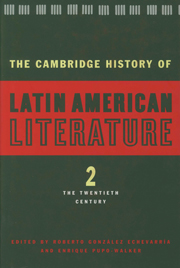Book contents
- Frontmatter
- Introduction to Volume 2
- 1 Modernist poetry
- 2 Modernist prose
- 3 The Vanguardia and its implications
- 4 The literature of Indigenismo
- 5 Afro-Hispanic American literature
- 6 The Criollista novel
- 7 The novel of the Mexican Revolution
- 8 The Spanish American novel from 1950 to 1975
- 9 The Spanish American novel: recent developments, 1975 to 1990
- 10 Spanish American poetry from 1922 to 1975
- 11 The modern essay in Spanish America
- 12 Literary criticism in Spanish America
- 13 The autobiographical narrative
- 14 The twentieth-century short story in Spanish America
- 15 Spanish American theatre in the twentieth century
- 16 Latin American (Hispanic Caribbean) literature written in the United States
- 17 Chicano literature
- Index
- Bibliographies
- References
11 - The modern essay in Spanish America
Published online by Cambridge University Press: 28 March 2008
- Frontmatter
- Introduction to Volume 2
- 1 Modernist poetry
- 2 Modernist prose
- 3 The Vanguardia and its implications
- 4 The literature of Indigenismo
- 5 Afro-Hispanic American literature
- 6 The Criollista novel
- 7 The novel of the Mexican Revolution
- 8 The Spanish American novel from 1950 to 1975
- 9 The Spanish American novel: recent developments, 1975 to 1990
- 10 Spanish American poetry from 1922 to 1975
- 11 The modern essay in Spanish America
- 12 Literary criticism in Spanish America
- 13 The autobiographical narrative
- 14 The twentieth-century short story in Spanish America
- 15 Spanish American theatre in the twentieth century
- 16 Latin American (Hispanic Caribbean) literature written in the United States
- 17 Chicano literature
- Index
- Bibliographies
- References
Summary
The contemporary Spanish American essay is born simultaneously with the twentieth century in 1900, the year in which José Enrique Rodó (1871-1917) publishes Ariel [Ariel] in Montevideo. Nearly a century later, it is a book that continues to be read with interest and even debated with passion. While much of what was once at stake in Ariel is largely outdated, Rodó’s essay has not lost a certain brand of intellectual mundonovista charm which still touches something deep within the Spanish American spirit. Before establishing what is today at issue in Ariel, it is necessary to situate it within its historical context.
When Ariel appeared in 1900, the modernista wave that swept America and even extended to Spain was at its apogee. After publishing Prosas prof anas (1896), a founding text of the modernista aesthetic, Rubén Darío travelled to Spain in 1899 and to Paris the following year. It was a moment of apotheosis for the great poet whose revolutionary writing was already a phenomenon internationally known and revered. Ariel was at once a reflection and an exaltation of this spiritual climate, as evidenced by its florid, précieux language and its gallicized Hellenism, not at all different from that cultivated by Darío. Yet what is striking is that Rodó was among the first harsh critics of Modernismo and specifically of Darío, in whom he recognized a superior artistic sensibility but whom he nonetheless eschewed for remaining aloof to the profound intellectual questions of the day. Rodó’s 1899 criticism of Darío is perhaps best characterized by its famous accusatory declaration: “He [Darío] is not the poet of America” (Rodó, Obras completas, 169).
- Type
- Chapter
- Information
- The Cambridge History of Latin American Literature , pp. 365 - 424Publisher: Cambridge University PressPrint publication year: 1996
References
- 2
- Cited by



